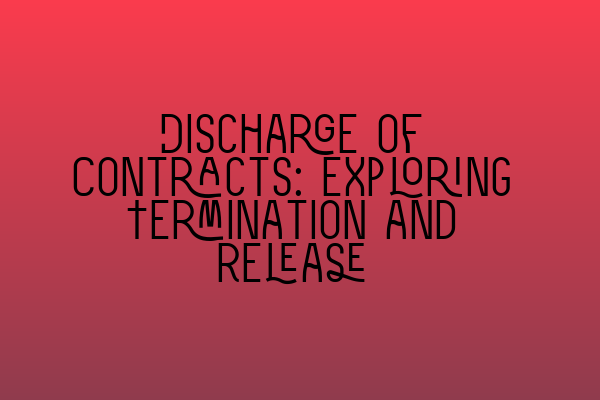Discharge of Contracts: Exploring Termination and Release
Contracts form the backbone of business and personal transactions, ensuring that parties involved are bound by their promises. However, there may come a time when a contract needs to be brought to an end. This process is known as the discharge of a contract. In this article, we will explore the various methods of terminating a contract and the concept of release.
The Importance of Understanding Contract Discharge
Understanding contract discharge is crucial for both parties involved in a contract. Whether you are a solicitor representing a client or an individual seeking to terminate a contract, having a solid comprehension of this process will enable you to navigate the legal landscape more effectively.
Before moving forward, it’s worth mentioning that the information provided in this article should be used as a general guide and does not constitute legal advice. Each case is unique, and it’s recommended to consult with a qualified solicitor for personalized advice.
Terrminiation of Contracts: Methods of Discharge
Contracts can be terminated using various methods, depending on the circumstances and the terms outlined in the contract itself. Let’s explore some of the most common methods of contract discharge below:
- Performance: The most straightforward way to discharge a contract is by fulfilling all the obligations outlined within it. When both parties have completed their promises, the contract is considered performed, and the obligations under it are met. However, it’s essential to ensure that performance occurs exactly as specified in the contract to prevent any potential disputes or breaches.
- Agreement: Contracts can be terminated through mutual agreement between the parties involved. This can be done through a formal amendment to the existing contract or through a new contract, commonly known as a “novation agreement.” It’s important to clearly document the agreement in writing to avoid any misunderstandings or potential disputes in the future.
- Breach: When one party fails to meet their obligations under a contract, it may lead to a breach. A breach can occur in various forms, such as non-performance, late performance, or defective performance. In such cases, the innocent party may choose to terminate the contract and seek remedies for the damages caused by the breach.
- Frustration: Frustration occurs when unforeseen events make it impossible to fulfill the contract’s obligations. For example, if a contract is contingent upon a specific event, and that event becomes impossible, illegal, or radically different from what was initially envisaged, the contract may be discharged due to frustration. However, proving frustration can be complex, and it’s advisable to seek legal advice in such situations.
- Operation of law: In some cases, a contract may be discharged due to the operation of law. This can occur when certain circumstances, such as the death or bankruptcy of one of the parties, make it impossible to perform the contract. The law may intervene to terminate the contract automatically in such situations.
It’s important to note that these methods of contract discharge are not exhaustive, and there may be other specific circumstances or legal principles that can affect how a contract is terminated. Consulting with a solicitor who specializes in contract law is advisable to ensure you are navigating the termination process appropriately.
The Concept of Contractual Release
In addition to the methods of contract discharge mentioned above, one concept that can play a significant role in the termination of a contract is contractual release. Contractual release is a legally binding agreement between the parties involved, releasing each other from any future obligations or claims arising from the contract.
Contractual release can be used as a way to terminate a contract, especially in cases where both parties agree to end the contract mutually. It provides a formal and documented release from further liability, ensuring that neither party can assert any claims for future non-performance or damages.
However, it’s essential to be cautious when considering contractual release, as it extinguishes all claims and obligations arising from the contract. Therefore, it’s crucial to fully understand the implications of a contractual release and seek legal advice before entering into such an agreement.
Conclusion
Discharge of contracts is an integral part of the legal landscape, providing a means of terminating obligations and relationships established through contracts. Understanding the various methods of contract discharge and the concept of contractual release is crucial for both solicitors and individuals involved in contract termination.
This article has provided an overview of contract discharge, exploring methods such as performance, agreement, breach, frustration, and operation of law. Additionally, the concept of contractual release was discussed as an essential tool in terminating contracts.
For more insights into legal practice and decision-making, you may be interested in reading our related article: Unveiling Real-Life Case Studies: Insights into Legal Practice and Decision-Making
If you’re curious about solicitor salaries in the UK and the factors that can affect income, check out our related article: Exploring Solicitor Salaries in the UK: Average Earnings and Factors Affecting Income
Mastering client relationship management skills is a crucial aspect of being a solicitor. To learn more about enhancing trust and loyalty with clients, read our related article: Mastering Client Relationship Management: Skills for Solicitors to Enhance Trust and Loyalty
If you’re considering pursuing a law school education in the UK, our article on choosing the right path for your future may be of interest to you: Pursuing a Law School Education in the UK: Choosing the Right Path for Your Future
For those aspiring to become solicitors, securing training contracts is a crucial step. Our related article provides a roadmap to becoming a solicitor: Securing Training Contracts: A Roadmap to Becoming a Solicitor
Remember, contract termination is a complex area of law, and seeking professional advice is always recommended to ensure you are following the appropriate legal procedures. If you require further assistance or guidance with contract discharge, don’t hesitate to consult with a qualified solicitor.
